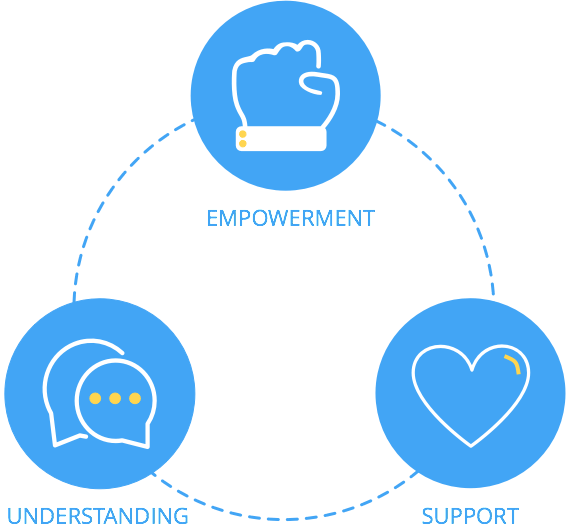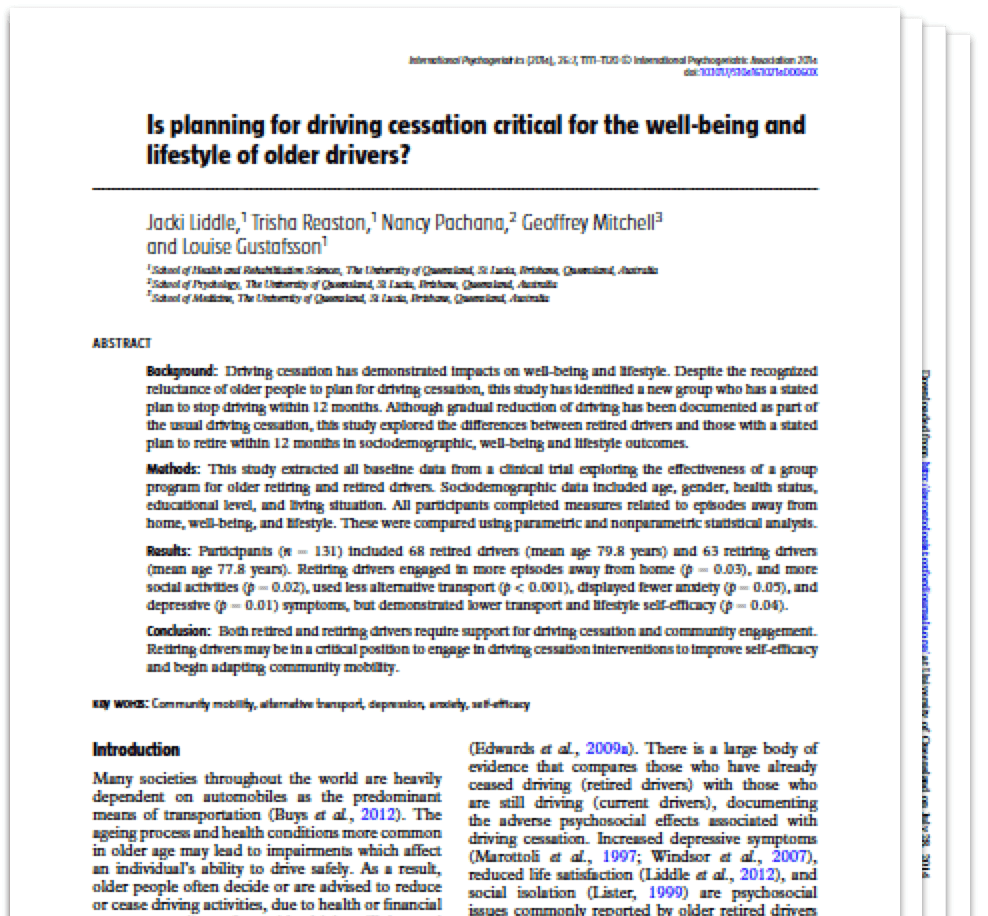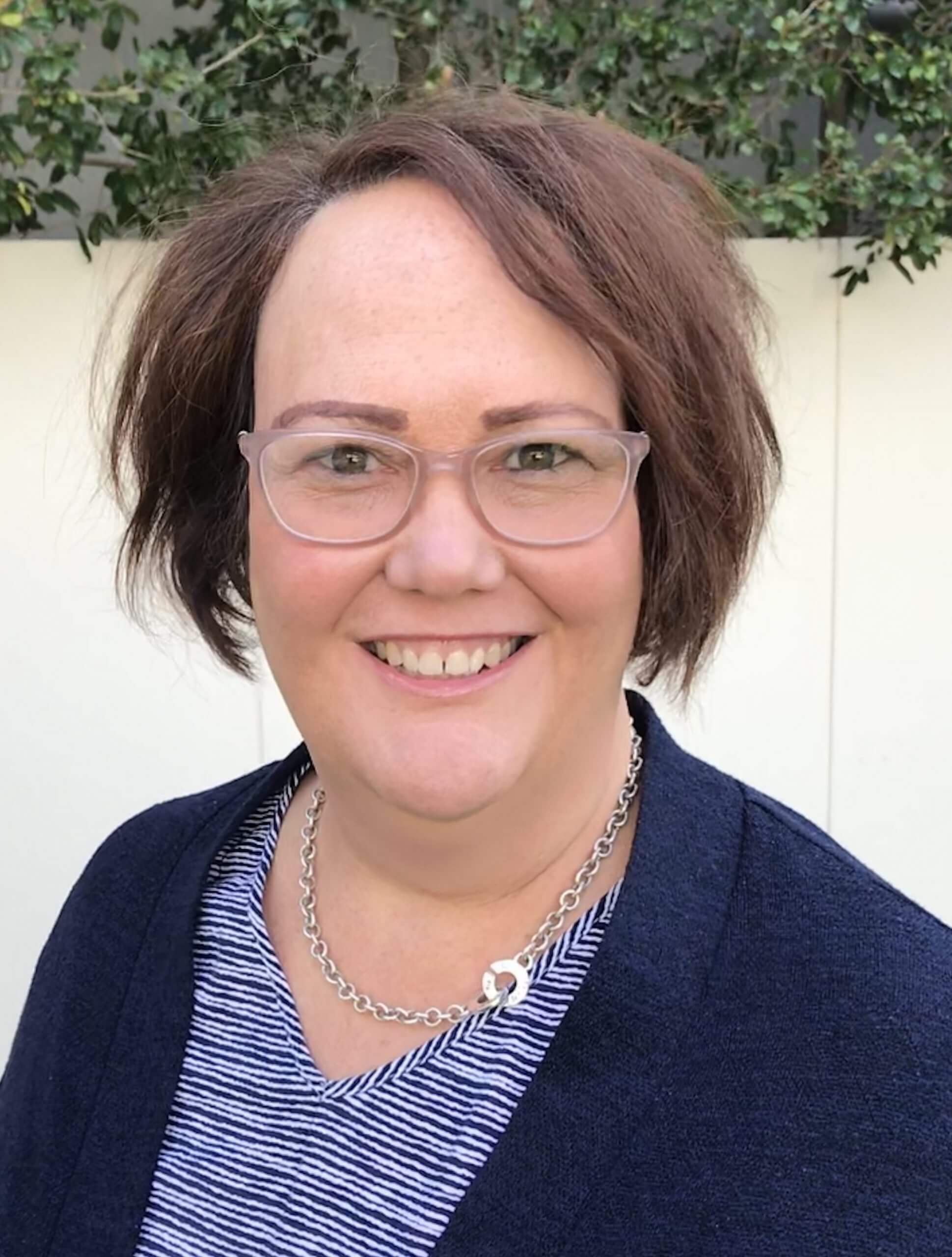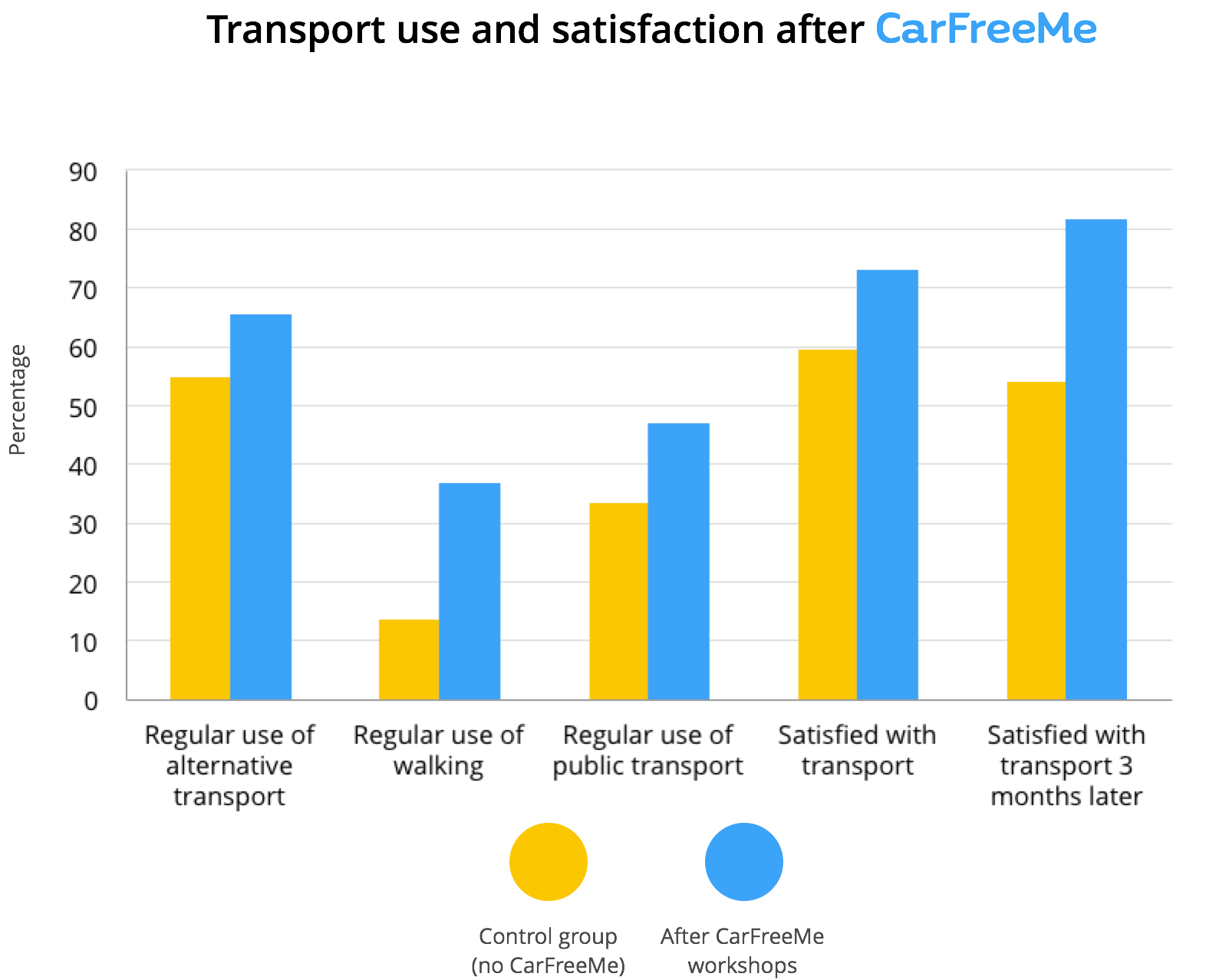The CarFreeMe Program (formerly known as UQDrive) is a community-based education and support program, developed by experts at The University of Queensland, to improve outcomes for older people who retire from driving. The program utilises effective, research-based, client-centred methods to help older people manage driving cessation. It has been demonstrated in a randomised controlled trial to increase community mobility and transport satisfaction in older adults following driving cessation (Liddle et al, 2014).
CarFreeMe has been developed in collaboration with the program participants since 2001. We surveyed them about their needs, and the approaches and resources they prefer to ensure the program runs successfully.
Five themes came out of the survey and have been taken into consideration while developing CarFreeMe:
- planning and preparation
- respect and control
- peers and experts
- content suggestions
- format suggestions

Be empowered. We work around your lifestyle. You decide on what you want to get out of the workshops and we provide you with the knowledge and skills you need so you can get the best out of the program.
Be supported when you make your decision. For some people it just clicks to be car free. Others want to thoughtfully plan their car free life. And that’s totally fine. We will adapt the program to suit your needs.
Be understood. It is not just about your car. It is also about what your car means to you. It is normal that some of your family members and friends don’t understand where you are coming from. That is what the workshops are here for. It is a place and time you are with people who actually get you.
The program draws on successful approaches that makes the workshops very practical. We have tested and improved CarFreeMe over time to make sure it is as useful as possible in your daily life.The key is for you to be confident in your decision and thoughtfully plan your options.

The feedback from the participants about the CarFreeMe workshops has been very positive. At the beginning, we fear we won’t socialise and be active anymore if we don’t have a car. After the program, the participants got out of the house more and used other transports more. They still do the things they want to do and go where they want to go. When asked about how satisfied they were with the program, they rated CarFreeMe a 9.7/10. In their own words, the psychological, social supports, and practical strategies are some of the most useful aspects of CarFreeMe. From a psychological point of view, group members say they feel more ready to make the right decision, at the right time.
Scott, Theresa L., Liddle, Jacqueline, Sidhu, Raychelle, Mitchell, Geoffrey, Beattie, Elizabeth, Gustafsson, Louise and Pachana, Nancy A. (2020). Adaptation of the CarFreeMe driver retirement intervention to provide driving cessation support to older people living with dementia. Brain Impairment, 1-12. doi: 10.1017/brimp.2020.16
Scott, Theresa, Liddle, Jacki, Mitchell, Geoffrey, Beattie, Elizabeth and Pachana, Nancy (2019). Implementation and evaluation of a driving cessation intervention to improve community mobility and wellbeing outcomes for people living with dementia: study protocol of the ‘CarFreeMe’ for people with dementia program. BMC Geriatrics, 19 (1) 66, 66. doi: 10.1186/s12877-019-1074-6
George, Stacey, Barr, Christopher, Berndt, Angela, Crotty, Maria, Milte, Rachel, Nussio, Amy and Liddle, Jacki (2019). Community participation for people with trauma injuries: a study protocol of a crossover randomised controlled trial of the effectiveness of a community mobility group intervention (CarFreeMe TI). Brain Impairment, 20 (1), 96-103. doi: 10.1017/BrImp.2019.1
Liddle, Jacki, Liu, Xinyu, Aplin, Tammy and Gustafsson, Louise (2015) The experiences of peer leaders in a driving cessation programme. British Journal of Occupational Therapy, 78 6: 383-390.
Liddle, Jacki, Reaston, Trisha, Pachana, Nancy, Mitchell, Geoffrey and Gustafsson, Louise (2014) Is planning for driving cessation critical for the well-being and lifestyle of older drivers?. International Psychogeriatrics, 26 7: 1111-1120.
Liddle, Jacki, Haynes, Michele, Pachana, Nancy A., Mitchell, Geoffrey, McKenna, Kryss and Gustafsson, Louise (2014) Effect of a group intervention to promote older adults’ adjustment to driving cessation on community mobility: a randomized controlled trial. Gerontologist, 54 3: 409-422.
Liddle, Jacki, Gustafsson, Louise, Bartlett, Helen and McKenna, Kryss (2012) Time use, role participation and life satisfaction of older people: impact of driving status. Australian Occupational Therapy Journal, 59 5: 384-392.
Gustafsson, Louise, Liddle, Jacki, Liang, Phyllis, Pachana, Nancy, Hoyle, Melanie, Mitchell, Geoff and McKenna, Kryss (2012) A driving cessation program to identify and improve transport and lifestyle issues of older retired and retiring drivers. International Psychogeriatrics, 24 5: 794-802.
Gustafsson, Louise A., Liddle, Jacki M., Lua, Shunwei, Hoyle, Melanie F., Pachana, Nancy A., Mitchell, Geoffrey K. and McKenna, Kryss T. (2011) Participant feedback and satisfaction with the UQDRIVE groups for driving cessation. Canadian Journal of Occupational Therapy, 78 2: 110-117.

Dr Jacki Liddle
Dr Jacki Liddle is a research fellow and occupational therapist with the School of Information Technology and Electrical Engineering. She focuses her research on community participation, life transitions, community mobility, and technology. She works with older adults, people living with dementia, people with neurological conditions, and family carers. Researching the experiences related to retirement from driving for older adults led to the development of the UQDRIVE program, now known as CarFreeMe. Contact Jacki to collaborate.

AProf. Louise Gustafsson
Dr Louise Gustafsson is an occupational therapist and Professor in the School of Allied Health Sciences at Griffith University, and is lead researcher of the ROAMM (Restoring Occupations and Community Participation) Project in the Hopkins Centre, Menzies Health Institute of Queensland. She wants to improve outcomes for people with neurological conditions and injury and is most interested empowering people to engage in their occupations long after the acute event, injury or diagnosis and to partner with people with lived experience in all research.

Prof. Nancy Pachana
Dr Nancy A. Pachana is a clinical geropsychologist and professor in the School of Psychology at The University of Queensland, and is co-director of the UQ Ageing Mind Initiative,providing a focal point for clinical, translational ageing-related research at UQ. Shehas an international reputation in the area of geriatric mental health, particularly late-life anxiety and driving in later life. Nancy was elected a Fellow of the Academy of Social Sciences in Australia in 2014.

Prof. Geoffrey Mitchell
Now in full time clinical practice
Geoffrey Mitchell is a former Professor of General Practice and Palliative Care, and former head of the University of Queensland’s MBBS Program at Ipswich. His main research interest was in the role of General Practitioners in palliative care. Most of former Professor Mitchell’s impact was in influencing the conduct of palliative care in the community. During his career, he had input into major policy initiatives at local, state and national levels and initiated the International Primary Palliative Care Network.
Dr Kryss McKenna
The CarFreeMe research team would like to acknowledge the work of the late Dr Kryss McKenna in the early development of the program.
Dr. McKenna was a Senior Lecturer in Occupational Therapy in the School of Health and Rehabilitation Sciences at The University of Queensland, Brisbane, Australia. She had a longstanding clinical, teaching and research interest in client education and a strong commitment to the client-centred delivery of educational interventions.
CarFreeMe © 2018 | Terms of Use | Disclaimer
CarFreeMe is supported by UniQuest, the commercialisation company of The University of Queensland

